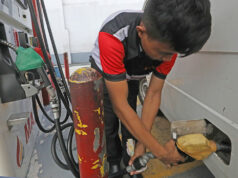Rice farmers urged to consider vegetable farming amid more liberal import regime
EAST-WEST Seed Group said rice farmers must consider diversifying their crops to improve their income in the face of liberalized rice imports.
“I think rice farmers need to diversify. They need to diversify into high-value crops, into vegetables, which gives them… better income than rice. I know because of the Rice Tariffication Law the rice farmers are really worried that the price of palay would go down,” Mary Ann P. Sayoc, public affairs lead of East West Seed told reporters in a briefing on Friday.
Ms. Sayoc said a vegetable farmer can earn more in 2,000 square meters than from one hectare of rice.
“Vegetable farming contributes to improved livelihood of farmers. If you compare the income of farmers from vegetable compared to rice, vegetable farmers earn more per hectare,” she said.
In a text message to BusinessWorld, she said a farmer planting bitter gourd, or ampalaya, can earn P500,000 per hectare against P75,000 from rice.
The equivalent earnings from eggplant and tomato are P360,000 per hectare, and pumpkin P230,000.
East-West Seed Group was founded in the Philippines in 1982 by Simon Groot of the Netherlands, with seed trader Benito Domingo in Lipa City, Batangas. It is engaged in research, development, production, and distribution of vegetable seed, specifically of vegetable varieties that are adapted to tropical markets and growing conditions and generate increased yield and productivity for farmers. It also helps farmers maximize their yields and income through better understanding of vegetable production.
The Rice Tariffication Law allows rice to be imported more freely by private entities, in exchange for a 35% tariff. The threat of cheaper rice from more efficient producers in Southeast Asia has pressured the price of palay, or umilled rice, producers of which may have to compete with rice grown in Vietnam or Thailand.
The Philippine Statistics Authority (PSA) said that in the first week of June, the farmgate price of palay, the form in which it is sold by domestic farmers, fell 0.8% to P18 per kilogram.
“We can offer them ways to diversify their income and teach them vegetable farming,” Ms. Sayoc said during the briefing.
To date, the company has reached 20 million smallholder farmers in 60 tropical countries in Asia, Africa, and Latin America through its 900 improved vegetable varieties.
She said the domestic seed industry still has room for growth from still-untapped markets.
“I think the Philippines still has many things to offer. For one, there are still many areas where seed companies could grow their seed, produce their seed, especially in the far-flung areas. I think we could still produce more and the seed industry could really contribute a lot to food security through improved varieties,” she said. — Vincent Mariel P. Galang



